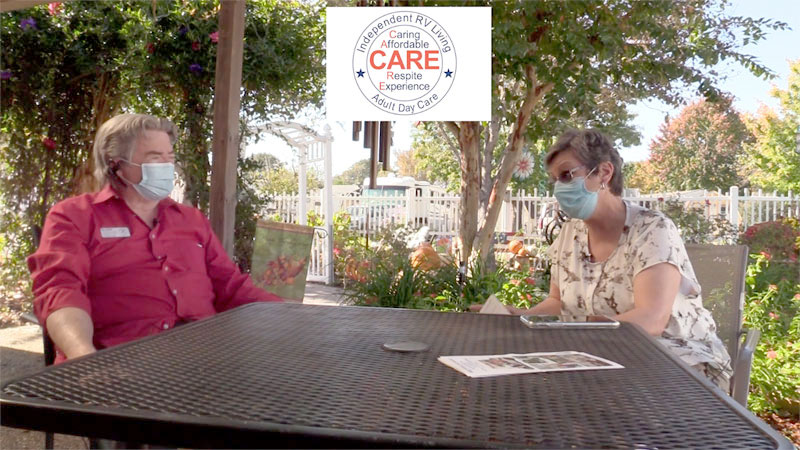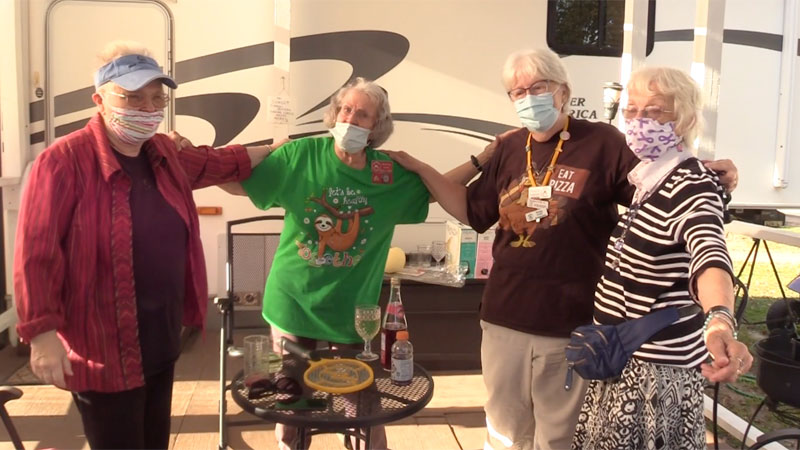rv lifestyle - Caring, AffordablE Respite Experience
Living in your Stationary RV in a Safe Environment
Hi, Michelle Fontaine and we are at a place that we’ve been trying to get to for two years. Two years ago, Laurie and I attended the 59th Escapade, the Escapee’s reunion in Tucson, Arizona. And we came across this information about Escapee’s CARE, and it really felt like a great story. So, two years later, here we are.
I’m sitting with Crystal Saulters, the Activities and Events Coordinator for CARE. Crystal, what does CARE stand for, the original definition of care?
Crystal: Continued assistance for retired Escapees.
Michelle: I would imagine a full time RVer as they’re getting up in age worries about that. What happens when I hurt myself, or I can’t drive, or we have to get medical attention? You really are providing such an important answer to that question, aren’t you?
Crystal: Yes!
Michelle: We also met with Russ Johnson, Executive Director for CARE.
 Russ Johnson: We are a separate nonprofit 501(c)(3). And it was a concept really that began with the founder of the Escapee’s RV Club, Kay Peterson and Joe Peterson. Kay was a registered nurse, and they were travelers like the rest of us in the RV club. And as Joe would work at an electrical project for the government, Kay would then work in the assisted living or nursing home community in a particular area that they were in. And one thing that troubled her was the fact that people going into assisted living and nursing homes, that they had to put up a large sum of money generally. And if they didn’t like the services, they might lose a good deal of their life savings if they left to try to go someplace else.
Russ Johnson: We are a separate nonprofit 501(c)(3). And it was a concept really that began with the founder of the Escapee’s RV Club, Kay Peterson and Joe Peterson. Kay was a registered nurse, and they were travelers like the rest of us in the RV club. And as Joe would work at an electrical project for the government, Kay would then work in the assisted living or nursing home community in a particular area that they were in. And one thing that troubled her was the fact that people going into assisted living and nursing homes, that they had to put up a large sum of money generally. And if they didn’t like the services, they might lose a good deal of their life savings if they left to try to go someplace else.
Crystal: There is an application process. Part of the application goes to the doctor, which will indicate to us that this person can live independently. And then we have a committee that has to do with finances. Another one, of course, which is Judy, our facility nurse that, you know, medically. And then Russ, our director, the overall say of accepting them. The criteria is that you have to be able to live independently on your own, which basically if you can get yourself over to our dining room for meals, you’re qualified.
Michelle: Let’s talk a little bit about the finance part of it. My understanding is that this is a lot less expensive than traditional independent living facilities, correct? And is it kept within their monthly income, or do they need to have other money to draw from? How does that work?
Crystal: For a single person, it’s right at $1,000 a month, and that’s everything. And then if it were a couple, it would be an extra $500.
Michelle: For that monthly fee, tell us again what does that include? Go down the list.
 Crystal: It includes your site with your own personal storage shed. You’ll have a phone box there, electricity, and water hookups. You are provided with trash pickup, maintenance to mow the grass, housekeeping to come to your RV and clean every other week, and laundry to be picked up and done and brought back to you every week. Transportation. Anything over a 15 mile radius, there is a charge. I think it’s 50 cents per mile.
Crystal: It includes your site with your own personal storage shed. You’ll have a phone box there, electricity, and water hookups. You are provided with trash pickup, maintenance to mow the grass, housekeeping to come to your RV and clean every other week, and laundry to be picked up and done and brought back to you every week. Transportation. Anything over a 15 mile radius, there is a charge. I think it’s 50 cents per mile.
Crystal: Aside from our resident program, we also have an adult daycare. Our adult daycare is the only one in Polk County, which serves the whole tri-county area because of where we’re located not very far as, you know,
north county lines.
We have a full-time LVN, which is our facility nurse. And we have two CNAs. And they are primarily for the adult daycare. However, Judy, our facility nurse, she takes care of all the residents. She’s very, very much involved in what they have going on.
We have a way of checking on our residents every day by 10 o’clock. And they don’t even realize that we’re checking up on them. We ask them to call in by 10 o’clock every day to let us know what their plan is for the day. So, if they tell us that they’re going to come for lunch, and then 12 o’clock rolls around and we haven’t seen them yet, then we check on them. But many people, especially those that, you know, are trying to eat on the healthy side, or on a diet, or just, you know, want to be more independent, they will choose to go out to eat, or to cook, and do their own thing.
Michelle: How about pets? Crystal: Oh, we love pets. We’re very pet friendly. I would say at least if not more, at least half of our residents have a dog. Some of them have cats. We actually have a cat on the loose right now that we’re trying to catch. And we will before the day’s end.
Michelle: When talking to some of the people here and asking what the main perks are for them, we hear they don’t have to cook or do laundry, right? And you’re in a community.
One person even told us the story where they had– they bought a house, they lived in a house for awhile, but then when they got into their 80s, they decided to come here, and mainly because of those great perks and things they don’t have to do, and the feeling of community.
Wanda: I found out that there were four openings down here. I said, “Robert, come on, we’re going to go to CARE for a month and see if we like it.” And so, we did. What’s not to like?
Crystal: We do have a waiting list. And you know, some of the people on the waiting list, they wanted to reserve their spot for when that time comes.
Michelle: Thank you, Crystal, for telling us all about CARE, how this all fits together to benefit people who live here, taking the stress out of daily living. Russ, thank you so much for filling us in on this part of the CARE organization. And please, if you would like to donate to this very worthy cause, you can do so many ways. Their website is
www.escapeescare.org.
Russ: And thank you very much for coming to share the story of Escapee Care Inc with the rest of the country.


